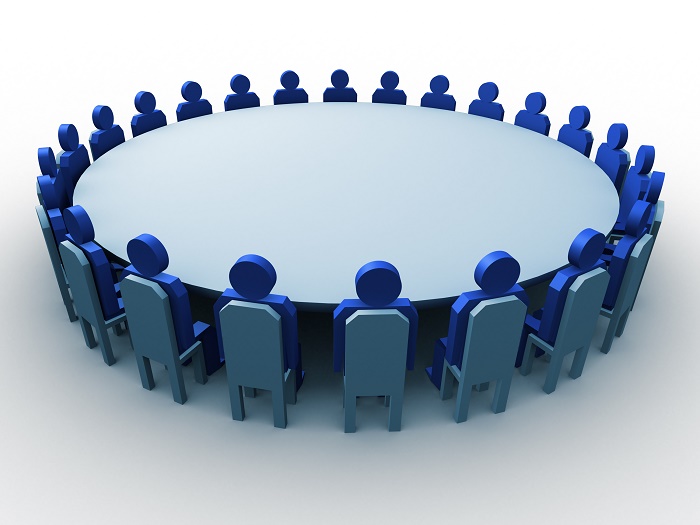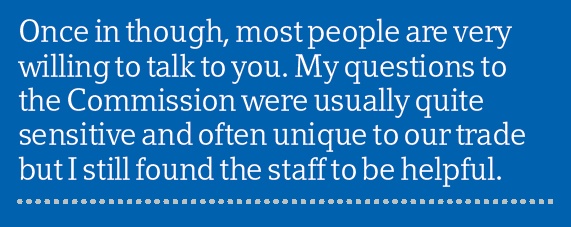With the UK General Election in May, deliberations over EU membership continue to be an important discussion issue. Tony Richman shares his thoughts on the European Union based on his many years of lobbying activities.

One of the usual attacks on the EU is that it is so opaque. Rules designed and discussed behind the scenes, nobody knows what’s going on except for some eurocrats, and then the Member States (MS) have to swallow the Brussels diktat. That’s more or less how the argument goes. But, is it true?
Commission: an open house
The Commission. With around 26,000 staff, numerous large buildings in Brussels, 33 directorate-generals, plus a number of service bureaus and agencies - it’s hard to quickly find the person/information you are looking for.
Once in though, most people are very willing to talk to you. My questions to the Commission were usually quite sensitive and often unique to our trade but I still found the staff to be helpful. After requests for a ‘state of play’, meetings with high-level experts were quickly set up. In general, I was genuinely surprised by the Commission’s transparency and helpfulness and the ease of maintaining ongoing contact.
European Parliament (EP): chaotic but not a fortress
The EP is often regarded as just another EU institute full of money-grabbing jerks, deciding on rules over our heads while claiming to be there for the citizens.
 With 751 members and thousands of staff and two meeting locations – Brussels and Strasbourg – this democratic circus is not really a glass house. Yes, you need a pass & know how to suss out the maze- but, on transparency, the trouble is not the lack of information, rather the abundance of the stuff! The website is pretty poor and the way the political groups work doesn’t help much either: the main ones are 200+ strong, so good luck finding the right MEP that actually has a real mandate.
With 751 members and thousands of staff and two meeting locations – Brussels and Strasbourg – this democratic circus is not really a glass house. Yes, you need a pass & know how to suss out the maze- but, on transparency, the trouble is not the lack of information, rather the abundance of the stuff! The website is pretty poor and the way the political groups work doesn’t help much either: the main ones are 200+ strong, so good luck finding the right MEP that actually has a real mandate.
So to find out what’s going on, you need to follow ‘Committees’ who have ‘Rapporteurs’ writing ‘Reports’ on Commission proposals. These reports are then heavily amended, sometimes with thousands of amendments and after the Committee votes on them, they can be changed again in the so-called plenary vote. You can also have several Committees talking about the same proposal – but which one is more important?
Then the analyses and spin, by the EP groups themselves, lobbyists and other journalists. Further on, information is often highly technical - things that often sound super boring but are in the end, super relevant.
But usually, by delving into a subject, you get the hang of it and pull out the main threads and sticking points to communicate to a larger audience. What doesn’t help is the constant travelling of MEPs between Brussels, Strasbourg and their home countries.
The Council: Black hole 1
Commission: quite open. EP quite chaotic. Council – the conglomeration of diplomats and government experts from the 28 MS: quite a black hole!
The Commission and Parliament tend to be pro-European, constantly proposing European solutions for the many problems we face. For those who do not like this continuous churning of European laws, they have a protecting mechanism: the Council.
The Council is the institute you usually see on the TV news. Heads of governments meeting several times a year when deals are struck on budgets, sanctions, etc. - the real powerhouse of Europe but also a black hole! National diplomats spending much of their posting attending endless ‘Working Groups’ to discuss all the proposals of the Commission, but also preparing the ministerial meetings of the Council. Some ministers have to attend these ministerial Councils on an almost monthly basis.
I call the Council a black hole because it’s not transparent at all. For good reason, say people at the Council: negotiations between EU MS need to be done in a certain outsider-free environment, so that the arguments can float and power-play can be applied without meddling of the media.
True, there are a lot of documents on the (dreadful) website of the Council. But seldom do you encounter a document telling you what’s going on inside a Working Group. So - call the press officers, who are very helpful indeed, but because they work for an institute that attaches values to secrecy, can only talk ‘on background bases’ and can only be quoted as ‘EU source’ – not even ‘Council source’. Otherwise the risk of distorting ongoing negotiations can be too big.
Many times, in goes the ingredients for a special recipe into the Council machinery, and then, after many months of deliberations, the end result: a very different dish! Nobody really knows how that happened, but it usually has to do with protection of national interests, lobbying by big companies, or other mechanisms.
The trilogue: Black hole 2
Still here? Good! We’re nearly at the end. The EU law-making process is all about compromises. So first the Commission makes a proposal, and then the EP wants to sharpen that proposal. So it adopts a lot of amendments. At the same time the MS discuss the original proposal as well, usually with the intention of watering it down.
As the EP has now got a real say in most EU topics since the 2009 Treaty of Lisbon, a second black hole has popped up in the Eurobubble. And that is the trilogue. An informal get-together of Commission, EP and Council to negotiate a compromise text that all institutions can live with. The trilogue is now hugely popular, though it formally does not exist and really takes place in the backroom. Around nine in ten law proposals are dealt with in this way, leading to a faster adoption of laws by the EP.
But is that good for democracy? I doubt it. Striking deals is important, but there is zero transparency in this intra-institutional haggling. Not even within the EP. Only a few MEPs, usually the Rapporteur and some colleagues, do the negotiations and then present the end result with an attitude of take-it-or-leave-it to their democratically chosen fellow MEPs.
 Maybe things will change but right now, the trialogue is the only way forward to deal with the range of new EU legislation the Juncker Commission will produce in the next few years.
Maybe things will change but right now, the trialogue is the only way forward to deal with the range of new EU legislation the Juncker Commission will produce in the next few years.
To conclude, is the EU opaque? No, not really. But as long as you are equipped with context and contacts, you can still engage with the bureaucrats and cover the results being achieved at a European Union level.
Photo: Tony Richman. Click here to view the next Editor's pick.